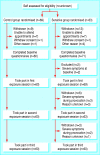Are some people sensitive to mobile phone signals? Within participants double blind randomised provocation study
- PMID: 16520326
- PMCID: PMC1440612
- DOI: 10.1136/bmj.38765.519850.55
Are some people sensitive to mobile phone signals? Within participants double blind randomised provocation study
Abstract
Objective: To test whether people who report being sensitive to mobile phone signals have more symptoms when exposed to a pulsing mobile signal than when exposed to a sham signal or a non-pulsing signal.
Design: Double blind, randomised, within participants provocation study.
Setting: Dedicated suite of offices at King's College London, between September 2003 and June 2005.
Participants: 60 "sensitive" people who reported often getting headache-like symptoms within 20 minutes of using a global system for mobile communication (GSM) mobile phone and 60 "control" participants who did not report any such symptoms.
Intervention: Participants were exposed to three conditions: a 900 MHz GSM mobile phone signal, a non-pulsing carrier wave signal, and a sham condition with no signal present. Each exposure lasted for 50 minutes.
Main outcome measures: The principal outcome measure was headache severity assessed with a 0-100 visual analogue scale. Other outcomes included six other subjective symptoms and participants' ability to judge whether a signal was present.
Results: Headache severity increased during exposure and decreased immediately afterwards. However, no strong evidence was found of any difference between the conditions in terms of symptom severity. Nor did evidence of any differential effect of condition between the two groups exist. The proportion of sensitive participants who believed a signal was present during GSM exposure (60%) was similar to the proportion who believed one was present during sham exposure (63%).
Conclusions: No evidence was found to indicate that people with self reported sensitivity to mobile phone signals are able to detect such signals or that they react to them with increased symptom severity. As sham exposure was sufficient to trigger severe symptoms in some participants, psychological factors may have an important role in causing this condition.
Trial registration: ISRCTN81432775.
Figures



Comment in
-
Brains and mobile phones.BMJ. 2006 Apr 15;332(7546):864-5. doi: 10.1136/bmj.332.7546.864. BMJ. 2006. PMID: 16613938 Free PMC article. No abstract available.
References
-
- National Radiological Protection Board. Mobile phones and health 2004: report by the board of the NRPB. Documents of the NRPB 2004; 15.
-
- Oftedal G, Wilen J, Sandstrom M, Mild KH. Symptoms experienced in connection with mobile phone use. Occup Med 2000;50: 237-45. - PubMed
-
- Hyland GJ. Physics and biology of mobile telephony. Lancet 2000;356: 1833-6. - PubMed
-
- Koivisto M, Haarala C, Krause CM, Revonsuo A, Laine M, Hamalainen H. GSM phone signal does not produce subjective symptoms. Bioelectromagnetics 2001;22: 212-5. - PubMed
-
- Hocking B. Preliminary report: symptoms associated with mobile phone use. Occup Med 1998;48: 357-60. - PubMed
Publication types
MeSH terms
Associated data
LinkOut - more resources
Full Text Sources
Medical
Research Materials
